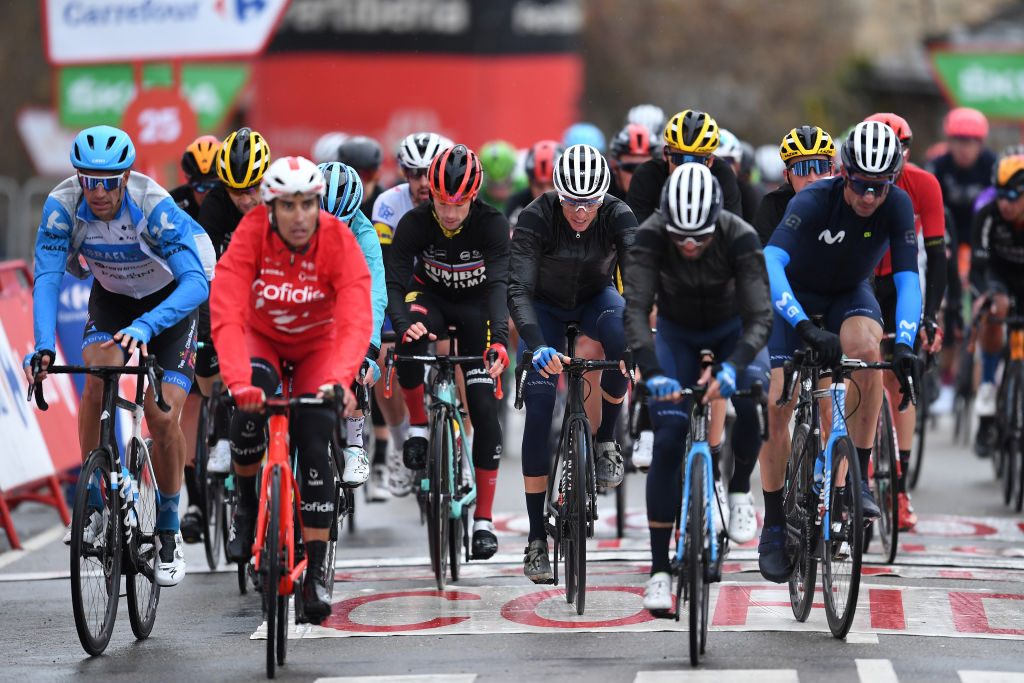Roglic praises Vuelta a España organisers for prioritising rider safety on stage 15
Slovenian says 'no need for extra risks' as GC times taken with 3km to go

If all the post-race interviews after stage 15 of the Vuelta a España had something in common, it was the background noise of riders rubbing their hands together furiously in a bid to get warm after a brutally hard six and a half hours in cold, wet conditions and – for the last part – into a vicious headwind.
On days like these, any gesture that alleviates the toughness or potential risks involved racing 230 waterlogged kilometres with 4,000 metres of climbing is appreciated.
Race leader Primož Roglič (Jumbo-Visma) surely voiced the thoughts of many in the peloton when he praised the organiser's decision to stop the GC clock at three kilometres to go because of a reported oil patch in the fast, technical finale.
Former Vuelta champion Alberto Contador, for one, would agree with Roglič to take GC times early. In 2016, the Vuelta used the same finish and Contador, despite being well placed ahead, crashed heavily on the left-hand bend before the last little rise, suffering injuries that led him to come close to abandoning.
Weary, frozen riders do not always make the best judges of dangers late in the stage, and Roglič argued that he "definitely" thought the organisers had made the best decision in Puebla de Sanabria.
"There was some oil or something and we shouldn’t take any more risks than were needed, so it’s very welcome," Roglič commented about the decision.
"It was the longest stage of the race, so it was a very tough day, fast, with bad weather at the end, cold and rainy. I’m really happy it's behind us," he added. In fact, stage 15 was the longest of any WorldTour or 2.HC event in the whole of 2020.
Get The Leadout Newsletter
The latest race content, interviews, features, reviews and expert buying guides, direct to your inbox!
Both stages 14 and 15, over 200 kilometres long, with large amounts of ‘invisible’, non-classified climbing, were the kind which any successful GC contender arguably fears the most in the third week - precious little to gain, and the constant underlying risk of all their hard efforts to earn a top place coming unravelled by a chance mishap.
Speaking before the stage, Jumbo-Visma’s George Bennett confirmed that behind the scenes, for all the racing appeared tough but straightforward, things were never nearly that simple.
"Yesterday [stage 14] it nearly went south. There was a group of 26 guys away early and number six and seven on the classification, all the action happened before the TV cameras came on, but we navigated that," Bennett said.
"With a big headwind, we can set ourselves up for a pretty uneventful day. But it's hard, everybody was up early, there’s a big transfer" – two hours south to Salamanca – "afterwards, one of those days which is all about trying to survive."
Warming to his point, Bennett said that Wednesday’s 200-kilometre grind across southern Galicia had been one of the hardest on the race.
"[Stage 14 was] super tough, full gas all day but on the profile and in the results and on the TV looks like nothing happened. Today’s 30 kilometres longer and there’s a thousand metres more climbing.
"It's these days that set up the big explosions on the mountain stages so you’ve got to survive these well. These are the ones that take it out of you," commented Bennett about Thursday's stage, with the additional wind, rain and cold weather making it even tougher.
The Vuelta a España now heads precisely into two of those mountain stages Bennett is talking about, with Friday’s brief incursion into the little-known Sierra de Francia in Spain's rugged far west, followed by a more set-piece, summit finish stage on Saturday. On both stages, the back-to-back 200-kilometre stages across Galicia will be taking their toll.
Alasdair Fotheringham has been reporting on cycling since 1991. He has covered every Tour de France since 1992 bar one, as well as numerous other bike races of all shapes and sizes, ranging from the Olympic Games in 2008 to the now sadly defunct Subida a Urkiola hill climb in Spain. As well as working for Cyclingnews, he has also written for The Independent, The Guardian, ProCycling, The Express and Reuters.
